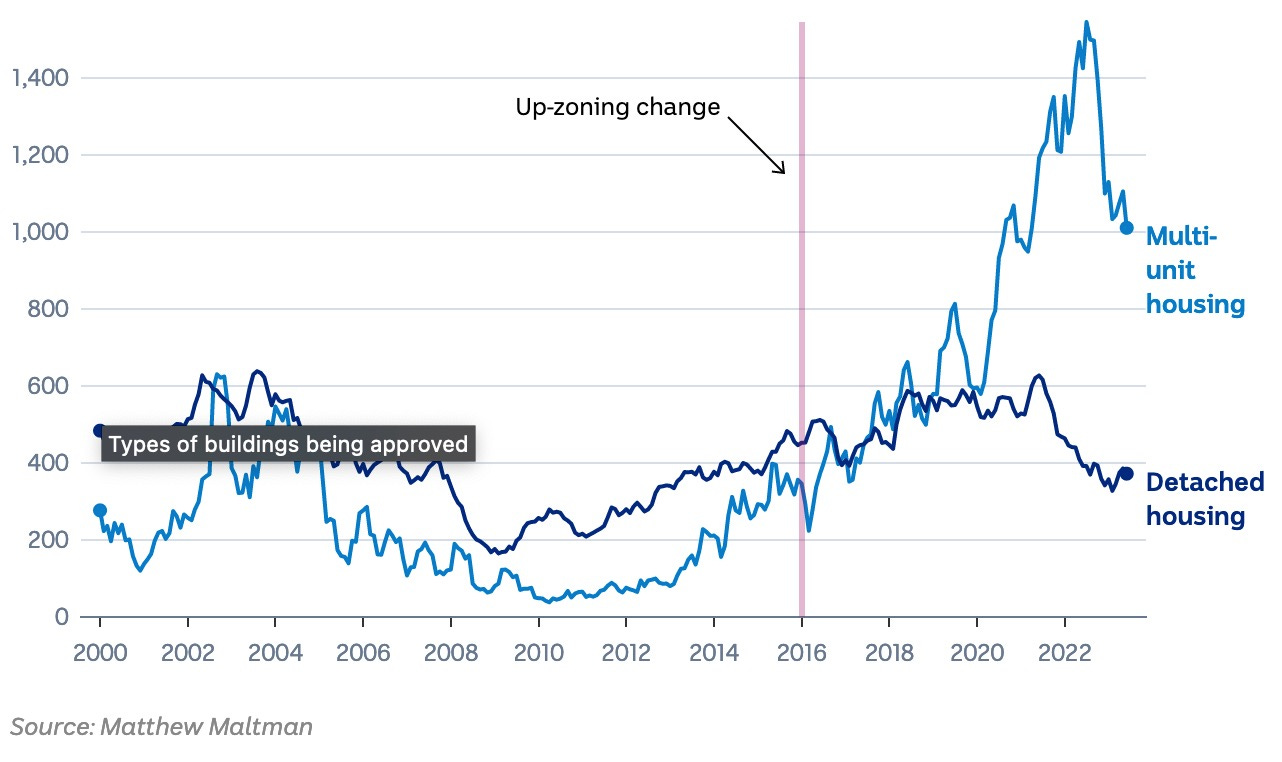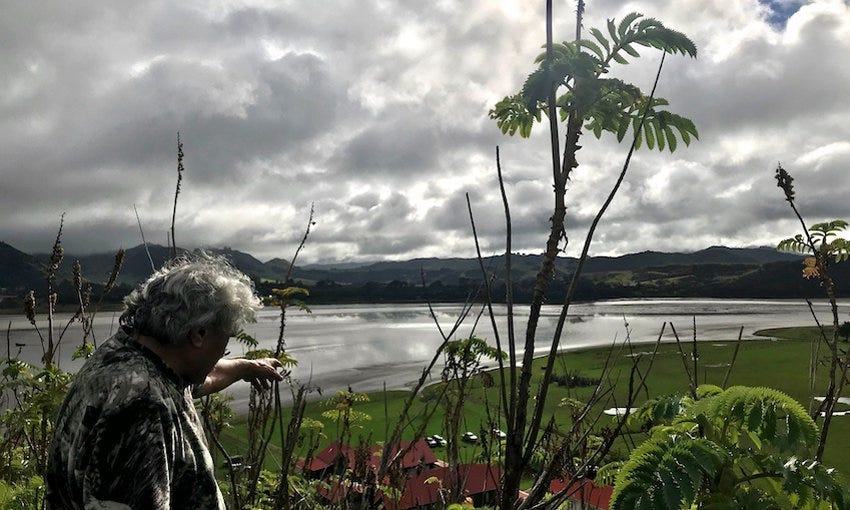A call to arms for Wellingtonians
The council is about to decide on density rules that will define Wellington housing for decades to come.
Mōrena, and welcome to The Bulletin for Tuesday, January 30, written by Catherine McGregor.
In today’s edition: Government’s first Question Time of 2024 today; Numbers of children in care experiencing harm continues to rise; Will Reserve Bank start walking back hawkish stance on interest rates? But first, The Spinoff is going to war – for a good cause.
Hannahs Laneway, Wellington. (Photo: Joel MacManus)
Introducing the War for Wellington
For the second time in its history, The Spinoff is declaring war. Seven and a half years ago, we launched the War for Auckland to advocate for increased density in the city. This morning we’re doing it again with the War for Wellington. As Wellington editor Joel MacManus explains, the impetus for the campaign is the new District Plan, currently being rewritten for the first time since 2000. Like Auckland’s Unitary Plan in 2016, the District Plan will decide the shape of the capital for decades to come – and The Spinoff is again lining up on the side of greater residential intensification. “We are unapologetic about our perspective: we believe that density is absolutely necessary for the future of Wellington,” writes MacManus. “If you care about Wellington and want it to be a thriving, liveable and equitable city, this matters to you.”
Decision day looming for new zoning rules
While the District Plan has been under review for more than two years, things are starting to move quickly. A series of hearings on intensification, heritage and zoning were held throughout 2023 on the proposed new plan and next week a panel of independent commissioners starts releasing its findings in a series of public briefings. On March 14, councillors hold a “mega-meeting” to vote on changes and decide the ultimate form of the District Plan. What about the MDRS? Over the weekend the government confirmed it will change the Medium Density Residential Standards – the rules requiring certain councils, in certain zones, to automatically approve the building of three homes, three storeys tall on a single site – into an opt-in system for councils. However Wellington will move ahead under the MDRS, which has already been incorporated into the District Plan.
Mayor says LTP could be changed to find money for pipes
At the same time as the zoning-focused District Plan is being finalised, the city’s Long-Term Plan (LTP) is also under review. The LTP is redrafted every three years and sets out council’s priorities for the following decade. Following a meeting on Monday with local government minister Simeon Brown, mayor Tory Whanau told Midday Report she was open to putting some parts of the draft LTP on hold to help address the water crisis. “We will be looking at projects and seeing what might be able to be delayed,” she said, adding that she was keen to work with the government on third party financing tools to shift the cost off the books and allow the council to focus on other priorities as well.
A graph of historic Auckland housing consents show the effects of the Unitary Plan.
The remarkable results of Auckland’s own zoning fight
It seems like a good time to look back at what Unitary Plan acheived after it was passed by Auckland Council in August 2016. Under the plan, around 75% of the city’s total residential area was “upzoned” – ie, changed to increase the amount of development allowed in the future. According to a Works in Progress report, the “upzoning stimulated construction immediately: permits for new housing approximately doubled within five years”. Australian research economist Matthew Maltman told the ABC he had seen “very few economic phenomena like it”. Contrary to many homeowners’ fears in 2016, house prices in Auckland did not "[fall] off a cliff" in real terms, Maltman said. However, “they have grown more slowly than the rest of the country and they've been less sensitive to changes in interest rates.”
See Gone By Lunchtime live at Q Theatre!
Gone By Lunchtime is taking the stage to bring its unique blend of insight, humour and irreverence to a very special live episode. Join The Spinoff’s Toby Manhire, along with Annabelle Lee-Mather (Ngāi Tahu, Ngāti Kahungunu, Ngāti Māmoe) (executive producer of The Hui) and Ben Thomas (former press secretary in the Key government), as they boldly step out of the studio and in front of an audience to cast a curious and caustic eye on New Zealand politics. Don’t miss this rare opportunity to see the 2023 winner of Best Politics Podcast (NZ Podcast awards) brought to life a Q Theatre as part of PodFest at Q.
When and where
7.30pm, Thursday 15th February
Q Theatre Rangatira – 305 Queen St, Auckland CBD
Click here to get your tickets now!
Parliament is back, baby
Parliament is sitting today for the first time in 2024, and as Thomas Coughlan writes, it’s going to be a huge day – a so-called Super Tuesday – for parliamentarians and journalists alike. With Monday a holiday for many, Cabinet was delayed until today, “smooshing it up against that day’s already packed schedule. Party caucuses meet in the morning, Question Time begins at 2pm. Usually there is also a post-Cabinet press conference, but this Tuesday is so super that this has been cancelled.” Among the setpieces to look out for: a parliamentary debate on the deployment of troops to the Red Sea; questions on the government’s approach to Māori issues; and six new MPs giving maiden speeches. Bridie Witton at Stuff also suggests there may be some tough questions for associate health minister Cathy Costello over whether she plans to freeze excise tax on tobacco, and on the wider government’s relationship with the tobacco industry.
Numbers of children in care experiencing harm continues to rise
The latest report on the safety of children under Oranga Tamariki (OT) care has shown a troubling rise in harms to children. The Safety in Care report found that 9% of children in care were harmed in the year ending June 2023, including neglect, physical and sexual abuse, compared to 7% in the 2022 year. It’s also a “significant jump since the ministry's first report in 2019, when about 5.6% of children in OT's care were found to have been harmed,” RNZ reports. The agency’s Nicolette Dickson told Checkpoint the latest figures are “horrendous and absolutely unacceptable” while noting that its practices had changed to ensure every harm raised was reported, which may have contributed to the higher totals. The team responsible for residences was also working "incredibly hard" to implement changes aimed at improving safety, she said.
The Spinoff is powered by its supporters
In 2023, Spinoff readers funded some of our most beloved, well-read, impactful work. Help Me Hera, The Cost of Being, powerful longreads, Election 2023 coverage, laugh-out-loud satire, Auckland stories, Wellington stories, Christchurch stories and everything in between were powered by Spinoff members and donors. If you did support us, thank you from all of us at The Spinoff. If helping fund well-crafted and insightful journalism is on your list for 2024, donate today or sign up to become a Spinoff member.
Click and Collect
Will Reserve Bank chief economist Paul Conway start walking back the bank’s hawkish stance on interest rates in his speech today?
A Porirua “sharing store” is closing for good over safety concerns. Its owner says she had to call police six times in the past three weeks.
A group of former Gloriavale members have filed an Employment Relations Authority claim for millions of dollars in lost wages and compensation.
Hospitality NZ is calling on the government to repeal a 2023 law that allows for more participation by communities in alcohol licensing decisions (Newsroom Pro, paywalled).
MFAT is reviewing its $1 million a year contribution to the UN agency responsible for feeding Gazans. Several countries have already halted funding over allegations some staff were involved in the October 7 attacks in Israel.
Feeling clever? Click here to play 1Q, Aotearoa’s newest, shortest daily quiz.
Nadine Anne Hura reflects on four years covering climate change from a Māori perspective, and why sometimes the best lessons emerge from the most unexpected places. Michelle Duff looks at how the media downplayed Byron Kelleher’s behaviour for years and asks: will he ever really be held accountable for his actions? Alex Casey details everything you missed from the return of Three’s breakfast show AM yesterday morning. Sam Brooks reviews everything good (or at least interesting) that’s coming to streaming this week.
Sporting snippet
The definition of sportsmanship: ex Black Cap Colin Munro overturns former teammate Martin Guptill’s run out after Guptill is struck by a stray ball.
Got some feedback about The Bulletin, or anything in the news? Get in touch with me at thebulletin@thespinoff.co.nz.
If you liked what you read today, share The Bulletin with friends, family and colleagues.













Dear Spinoff:
Would you please tell me why higher density is good for Wellington. Higher density as opposed to what?
Thank you,
Craig Knox
USA
So, in anticipation of the political hi-jinks ramping up (i.e. ... Winston & David unleashed??) it was good to see the item about sportsmanship in cricket & not surprising that it was a Kiwi who did it ... I hope they NEVER give in to the critics who say we are "too nice" - it makes me proud everytime 👍💕